Best SSD expansion drives for Xbox Series X|S 2024
Expand your Xbox console with these ultra-fast SSDs.
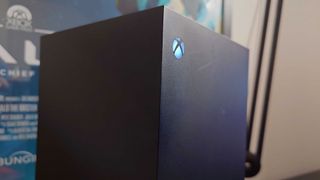
- The list in brief
1. Best for Xbox Series X|S
2. Best external SSD
3. Best alternate for Xbox Series X|S
4. Best expensive
5. Best alternate portable
- How to choose
Microsoft's latest consoles mean Xbox games can load faster than ever, but you'll to invest in the proper expansion card to play said games.
The Xbox Series X|S consoles raise the bar for console performance, with the new custom NVMe solid-state drive (SSD) storage a crucial component in those gains that see identical load time performance across Xbox Series X and Xbox Series S. You can also expand either console's storage capacity with external hard drives, or an SSD delivering the pinnacle in speed.
You can't just play current-generation games on any random SSD though. The price for moving the tech forward massively is the need to guarantee a minimum speed for developers to build around, so only a tiny handful of SSDs (designed as expansion card and officially licensed by Microsoft) will actually work if you want to play the latest games. The others will be best utilized for Xbox backward compatibility.
The quick list
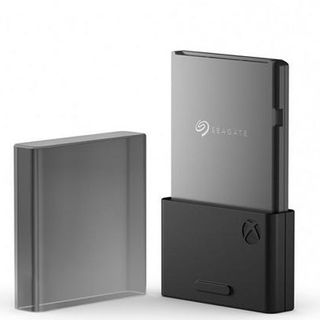
The first of two expansion card officially licensed by Microsoft to work with Xbox Series X|S consoles. Performance is identical to the internal ultra-fast SSD, so you're getting the same high quality with no variations. The cost isn't as bad as they used to be, but it's still pricey.
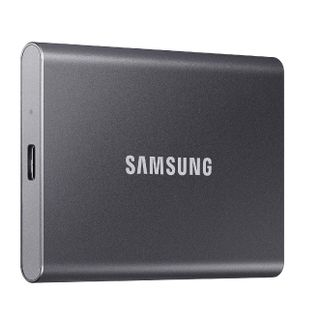
If you're looking for a great way to expand your storage for backward compatible games that also avoids breaking your bank account, this is the one to choose. The Samsung T7 portable is easy to use and comes in a variety of storage size configurations.
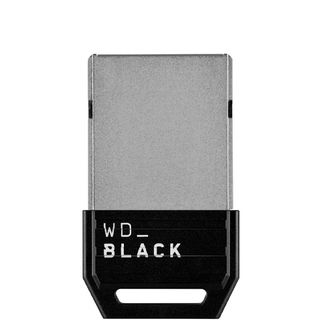
WD_Black's C50 Expansion Card provides a neat alternative to Seagate's offering. These cards are essentially identical and often hover around the same price, so just go for the one you see available at a lower cost.
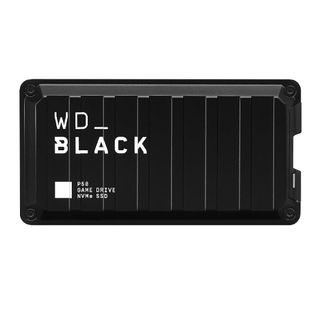
If you're willing to spend a lot of money, the WD_Black P50 means you can store a ton of backward compatible games and play them with quick loading times, while saving your console's dedicated storage and expansion cards for the more recent games. You'll need to brace your wallet for impact though.
Read more here

The Samsung T5 is another option for anyone focused on getting a portable SSD to store more backward compatible Xbox games in. You'll be able to play older titles at high speeds, but these SSDs are usually priced higher than they are worth. Unless portability is your primary focus and you see a nice discount, your money is better spent elsewhere.
Best for Xbox Series X and Series S
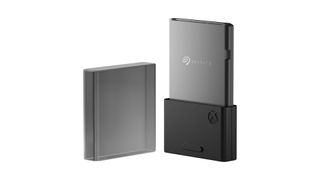
Specifications
Reasons to buy
Reasons to avoid
The Xbox Series X and Series S bring various enhancements over previous Xbox consoles, but speedy storage has proven one of the most impactful changes to these systems. The consoles rock best-in-class SSD drives, removing a severe bottleneck that punished earlier Xbox One consoles and speeding up load times across the board. But USB storage has significant limitations on SSDs, and for Xbox Series X and Series S, they're simply not adequate.
Expanding Xbox Series X and Series S storage is simple, with Microsoft creating the "Storage Expansion Card" for Xbox, an official Microsoft-approved SSD designed to meet the demands of current-generation gaming. These cards hook up through a dedicated "Storage Expansion" port, located at the rear of new Xbox consoles.
USB storage still works, but games designed for the consoles only play directly from the internal SDD or SSD expansion cards. Hard drives and SSDs connected via USB can only play older Xbox One, Xbox 360, and original Xbox titles via backward compatibility. While they can store games designed for Xbox Series X and Series S, you'll need to transfer games onto the internal SSD or expansion card to play.
| Header Cell - Column 0 | Seagate/WD_Black Expansion Card | USB external drive |
|---|---|---|
| Xbox Series X/S games | ✓ | Storage only |
| Xbox One games (upgraded) | ✓ | Storage only |
| Xbox One games (not upgraded) | ✓ | ✓ |
| Xbox 360 games | ✓ | ✓ |
| Original Xbox games | ✓ | ✓ |
The Seagate Storage Expansion Card is a simple plug-and-play solution, automatically configured to work with consoles straight out the box. It first launched in a single 1TB configuration, doubling the base Xbox Series X storage and tripling the initial offering of Xbox Series S. New 512GB and 2TB models were released in 2021, providing a cheaper entry point, plus a more expensive high-capacity alternative.
"I can't say the Xbox Storage Expansion Card is a great deal, yet I still wholeheartedly recommend it to those on the fence," we stated in our Xbox Storage Expansion Card review. "Yes, in terms of value, you can add much more space to your console for less with a cheaper USB external drive. But there's no alternative that integrates so well with Xbox consoles, making the complete experience hassle-free. It's a premium product with a high asking price, making it impossible to compare this to anything on the market."
The primary hurdle for most will be the price of the Seagate Storage Expansion Card. The 1TB model used to cost $220 in the U.S. with similar $280 and £220 going rates in Canada and the U.K. At the time, the price isn't surprising, in line with notoriously costly cutting-edge storage tech, drawing the best performance from either console with no compromises.
Fortunately, it's now far more reasonable, and you can now usually acquire a 1TB Seagate Storage Expansion Card for around $140 to $150. You'll still be spending a fair bit of money, but it's not as bad as it used to be.
While Xbox Series X and Xbox Series S support countless USB devices, only the Seagate Storage Expansion Card provides a true internal storage extension. It comes with no limitations, mirroring the base console in every way. If you can afford the premium, there's no better SSD than this.
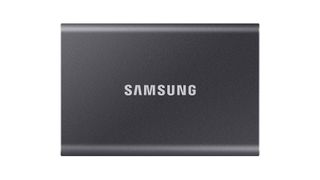
Best External SSD
2. Samsung T7 Portable SSD
Our expert review:
Reasons to buy
Reasons to avoid
With Xbox Series X and Series S expandable storage extending to external USB drives, the Samsung T7 Portable SSD should be on your radar. Its latest solid-state lineup delivers a balance of performance and relative affordability in a compact form factor. It's among the best SSDs for Xbox One, with many of the same benefits also amplified on Microsoft's latest console family.
Samsung distributes the T7 range in three capacities, 500GB, 1TB, or 2TB, with the former an accessible entry into high-performance storage, often available far below $100. The series peaks at 1,050MB/s read and 1,000MB/s write speeds, with the USB 3.2 support on each new Xbox pushing towards the best each drive delivers. It's about half the speed of Microsoft's internal NVMe SSD drive used by Xbox Series X and Series S. However, that speed differential has a minimal performance impact on titles compatible with USB-connected storage.
The Samsung Portable SSD T7, as with any USB drive, can play only Xbox One, Xbox 360, and original Xbox titles on Xbox Series X and Series S. The drives can also store Xbox Series X and Series S-optimized titles, but with each manually transferred to the internal SSD if played. The T7 SSD is a backward-compatibility maestro, while also excelling at shuttling upgraded titles to and from the internal storage. The high speed slices the transfer time over using a slower hard disk drive (HDD) for the same purpose.
The Samsung Portable SSD T7 also impresses with its construction, using premium materials for a lightweight yet rugged design. The drive sports an aluminum unibody, available in grey, red, or blue colorways, weighing just 58 grams. And inside the box comes the SSD, alongside a USB Type C-to-A cable used for Xbox consoles and a USB Type-C to C cable for other compatible devices.
While USB drives come with a handicap on Xbox Series X and Series S, the Samsung Portable SSD T7 provides the best in class when balancing performance with the price tag. The Seagate-branded expansion card may feature extended functionality, but this provides some of the benefits at a much more palatable starting price. While it requires some additional legwork due to limitations on new consoles, it's the best you'll find when skirting the expansion card.
Best Alternative for Xbox Series X and Series S
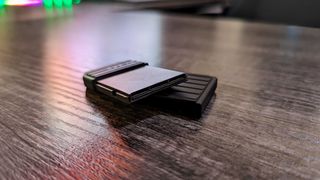
3. WD_Black C50 Expansion Card for Xbox Series X|S
Our expert review:
Reasons to buy
Reasons to avoid
For a long time, the only way to expand your internal Xbox Series X|S storage was through the Seagate Expansion Card. Fortunately, there is now an alternative option, and you can instead grab the WD_Black C50 Expansion Card if you happen to see a deal. These cards usually hover around the same price, which means you can expect to see the 1TB version of the WD_Black C50 Expansion Card available for around $150 on average.
Functionally, this card is identical to Seagate's offering, which itself provides identical performance to the 2.4GB/s ultra-fast SSD installed in the latest Xbox consoles. This means it doesn't matter if you have a game installed on this card or on the internal Xbox SSD, you can expect completely identical load times in the latest big games like Alan Wake 2, Baldur's Gate 3, or Starfield.
The only possible downside of this card compared to the Seagate version is the size options available. While there are both 512GB and 1TB versions, there is no 2TB offering. So if you need (and are willing to pay for) the absolute max additional space possible for current-generation games, you'll have to go for the Seagate card.
In our review of the WD_Black C50 Expansion Card, staff writer Zachary Boddy wrote that "I wish there were 2TB or even 4TB size options, but the card itself is well-designed and well-built, and performs flawlessly. This storage solution for Xbox Series X|S also has its merits in general, like offering a baseline guarantee of performance and reliability, making it incredibly easy and simple to install, and granting a level of portability not possible with other SSDs."
Best Expensive SSD
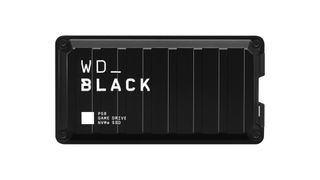
4. WD_Black P50 Game Drive
Our expert review:
Reasons to buy
Reasons to avoid
Western Digital made its performance-focused WD_Black lineup with considerations for gaming, making it one of the best high-speed SSD solutions on Xbox Series X and Series S. The shock-resistant, matte black metal shell channels an industrial design. At the same time, its compact form factor also makes it portable for those on the move.
As with all SSD drives, this proves beneficial when playing backward-compatible titles or offloading surplus titles from your internal SSD. The WD_Black 1TB P50 Game Drive delivers 2,000MB/s peak read and write speeds, although actual performance will fall short between lower sustained rates and limitations imposed by USB. But it's an ideal pick to reduce transfer times when shuttling titles to and from the SSD or when loading Xbox One, Xbox 360, or original Xbox games via backward compatibility.
The series comes in three capacities, with its 500GB model starting at $125, with additional larger models for a premium. But the 2TB model costs $350, whereas the official Seagate Storage Expansion Card provides much more value for less. It means that unless you're looking at the speed delivered by its 500GB or 1TB model, it's better to commit to the 1TB expansion card, given its benefits that extend to Xbox Series X and Series S Optimized games.
The WD_Black 500GB 1TB Game Drive is one of the best USB-based SSDs, down to its performance across Xbox and PC. While you'll find better per-GB value elsewhere, and performance falls short compared to the expansion card, you're getting an ideal middle ground when on a firm budget.
Best Alternate Portable
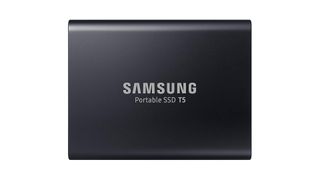
5. Samsung T5 Portable SSD
Our expert review:
Reasons to buy
Reasons to avoid
When expanding Xbox Series X and Series S storage, choosing a high-capacity SSD provides speed benefits while multiplying the room on your console. Opting for both speed and space will cost a premium but offers optimal performance across a broader catalog of installed titles. The 2TB variant of the Samsung T5 series earns our pick, positioned among the best SSDs for Xbox consoles, but at a significant price.
This SSD delivers up to 540MB/s read and write speeds, just over one-fifth of that provided by the internal Xbox Series X and Series S SSD. It still locks down a sizeable leap over standard hard drives, cuts load times, reduces transfer times, and generally eliminates a crucial bottleneck for your next-generation console.
While the 2TB model represents the top of the line, Samsung also has 500GB and 1TB models at lower RRPs. We recommend opting for some of the best hard drives for Xbox Series X and Xbox Series S for higher capacities, which, while slower, provide several terabytes at reasonable prices. SSDs are notorious for offering fewer gigabytes or terabytes per dollar over an HDD, and the Samsung T5 Portable SSDs are particularly high-priced considering what you're actually getting.
If you do happen to see one on sale, then this is a great way to easily store and play Xbox One, Xbox 360, and original Xbox titles in your gaming library. It's also easy to set up and carry around.
How to choose
With Xbox Series X and Series S featuring custom NVMe SSDs, the next generation heavily leans on fast storage to maximize performance. That high demand means that while USB 3.2 drives work with the console, they're limited compared to baked-in storage. Microsoft has partnered with Seagate on its own proprietary expansion solutions, mimicking the internal SSD used but compacted into a portable form factor. That positions the Xbox Storage Expansion Card series from Seagate and WD_Black as the few SSD expansions capable of playing Xbox Series-optimized titles.
Still, while things have certainly improved, the Microsoft-approved expansion cards aren't cheap, and with other USB SSDs also suited for backward compatibility and storage, you've got options to consider. The Samsung T7 Portable SSD provides a high-speed alternative, ideal for Xbox One, Xbox 360, and original Xbox titles via backward compatibility.
Get the Windows Central Newsletter
All the latest news, reviews, and guides for Windows and Xbox diehards.

Samuel Tolbert is a freelance writer covering gaming news, previews, reviews, interviews and different aspects of the gaming industry, specifically focusing on Xbox and PC gaming on Windows Central. You can find him on Twitter @SamuelTolbert.